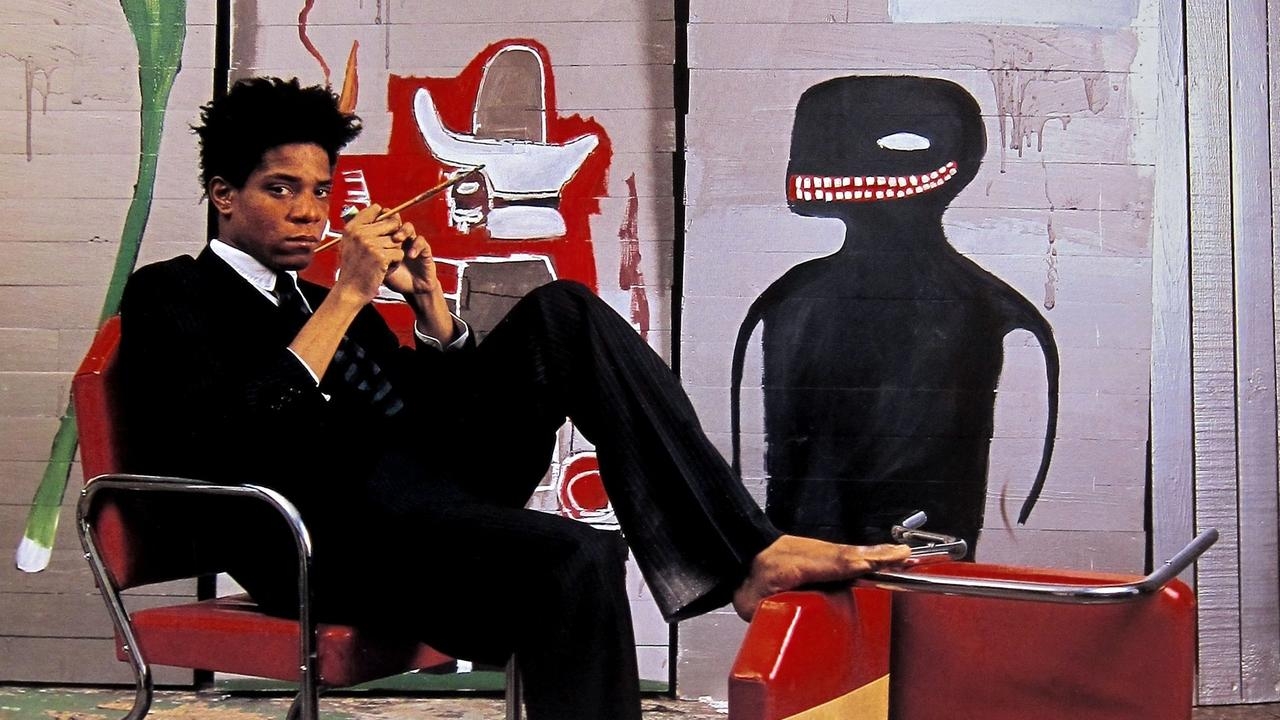By Chlotrudis Independent Film Society
Rating: 2 cats
Director: Tamra Davis

Country: united_states
Year: 2010
Running time: 88
IMDB: http://www.imdb.com/title/tt1568335/
Jason says: “In the last review I wrote (for the delightful MARWENCOL), I said that documentaries about art and artists were frequently disappointing, in part because filmmakers have a hard time translating the brilliance they see into something a non-artist can appreciate. JEAN-MICHEL BASQUIAT: THE RADIANT CHILD is an example of that, a loving tribute that probably tells his existing fans very little new but fails to paint a compelling enough picture to create new ones.
“In 1986,’ director Tamra Davis opens, ‘I filmed an interview with my friend Jean-Michel Basquiat.’ He died soon after, and Davis put the footage away, rediscovering it a decade later. It forms the spine of her documentary, although it is greatly augmented by stock footage, some imagery of his work, and contemporary interviews with Basquiat’s friends and acquaintances. A familiar picture emerges – the talented youth who gains fame and success, gets into bad patterns, including substance abuse, and either emerges stronger or, like Basquiat, dies young.
“You’ve seen this movie, both as a documentary and as a feature, if not necessarily about Basquiat specifically (in 1996’s Basquiat), though it’s the ones about musicians that generally get more play. And though it’s a cruel thing to say, Basquiat’s story as told by Davis isn’t a particularly interesting variation on the theme. It’s by turns inspiring and sad in all the usual ways, and his personal and professional life’s intersections with the likes of Andy Warhol and the rest of the New York art scene of the late 1970s and early 1980s means that there’s no shortage of colorful characters, but when looking at this film afterward, what stands out, makes it a particularly fascinating example of the genre? Very little.
“Indeed, in many cases, what seems to stand out are the stories Davis chooses not to tell. We’re told early on, for instance, that Basquiat ran away from home as a teenager, but late in the movie, there are frequent references to his father, a relationship that seems very close. This is obviously a complex relationship, worth delving into. But Davis skirts it, including bits of information but not delving deep. It may be a case of a filmmaker describing her subject as “my friend” in the film’s first minute not wanting to portray him badly, or it may be a lack of access to the people who could best talk on that aspect of his life. It may be something else. It doesn’t matter. For whatever reason, THE RADIANT CHILD feels like a sanitized, generic account, and even someone who may not particularly care for Basquiat’s art will probably concur that no artist desires or deserves that.
“With a name like THE RADIANT CHILD, one shouldn’t expect a warts-and-all biography, and those aren’t inherently better than any other kind. But the construction of the film is frustrating; it assumes some knowledge of Basquiat and his world but doesn’t seem to build on that knowledge – it doesn’t examine what makes his art work, or find a common theme in his dealings with the world around him. It’s a documentary that does very little to satisfy curiosity. Which leads me to ask, who is this film made for? The only answer I can come up with is the sort of admirer who wants to see any new footage of Basquiat, a complement to a filmmaker who has some footage she wants to do something with.
“This old footage being the movie’s reason for being leads me to a point I’m a little reluctant to make (because a festival screening in a venue that only occasionally shows film puts a lot of extra factors in play), that the film seemed very shaky technically. You expect that from mid-eighties home movies, but even in the newer segments, the sound in particular was sub-par, bad enough to take notice of.
“While that issue may be unique to that particular screening, the others aren’t. This isn’t quite a film without an audience, but one whose subject was clearly talented enough to deserve a more in-depth and challenging filmic memorial. 2 cats
“Seen 27 April 2010 at the Institute for Contemporary Art (Independent Film Festival of Boston)”
